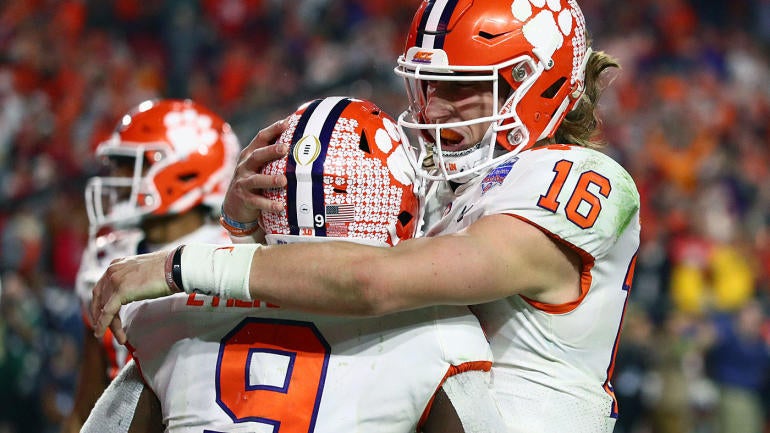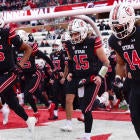
These are incredibly strange times. The COVID-19 pandemic has created chaos in all of our lives and put the 2020 college football season in limbo with many questions left unanswered. When will it start? Will they finish the season? What are the different plans that are being considered?
One of the options is to bump the season to spring -- which we'd all agree is the last resort to preserve a season and, in reality, the financial solvency of athletic departments around the country. But I just don't see how it can happen.
I'm not a "doomsday media member who's rooting for the virus." Quite the opposite (as Twitter will show). Trying to find hope during these times is something that all of us should be trying to do on a daily basis. But spring football? Nope. The logistics and unintended consequences would be so abundant that they would have lingering effects well beyond the 2020-21 school year. Here's why:
The product will be watered down
As much as we'd like to think that top-tier players play college football for the love of the game, the vast majority -- if not all -- have aspirations to play at the professional level. Will the NFL change its offseason timeline to suit the needs of college football? That's about as likely as going back in time to hit the reset button on 2020.
Say goodbye to seniors with NFL hopes. Projected No. 1 overall pick and Clemson quarterback Trevor Lawrence? He'd likely be gone as would Ohio State's Justin Fields. College football in the spring would be similar to the ill-fated Alliance of American Football or a real-life version of "The Replacements." Hopefully Shane Falco has eligibility left.
Would a diet version of college football be compelling? I'd love it. Give me 100 walk-ons on a roster, tee it up and let's go. But it's hard to believe that the product would be even marginally interesting for the general sports fan who doesn't pay attention to college football 24/7/365.
Players would clearly be employees
Money talks, and the efforts being made to preserve some sort of a college football season are being primarily driven by the need to keep athletic departments afloat. A spring season would be nothing more than a last-ditch effort to stay in the black. It'd be a cash grab, plain and simple.
Players in the NBA, MLB and NFL have already opted out of the season due to coronavirus. Those are professional players. What do you think is going to happen when amateur college football players not only have the same concern, but have the added concern that they aren't even being paid to play?
Northwestern players tried to unionize in 2014 to no avail. The National Labor Relations Board put an end to that movement one year later. But what's to prevent players from banding together to unofficially strike knowing that they, as amateurs, are being asked to participate in a clear cash grab without being paid? Nothing.
If you think the ongoing Name, Image and Likeness (NLI) plan is complicated, just wait until the aftermath of a spring season and the tentacles that grow from a tacit admission that players are employees.
Two seasons in nine months won't work
Let's just assume that the 2020 season will take place in the spring 2021. Well, there's also an actual 2021 season that needs to be played in 2021.
CBS Sports has spoken with multiple coaches who say that two seasons in nine months would be a nightmare for strength and conditioning, player development, academic progress, recruiting and pretty much everything else associated with the sport.
These aren't normal times, and certain concessions have to be made. But think about what teams would be asked to handle with two seasons in a calendar year: massive changes in personnel for both players and coaches, very little practice time, virtually no recruiting time, eligibility concerns and the potential for injuries to cost players multiple seasons. This would rattle the foundation of a sport that's already on shaky ground.
It might be compelling for fans, even if the spring season is watered down. But it'd be pure chaos for those actually involved in the product.
There's still a pandemic going on
Doctors and scientists haven't developed a vaccine for COVID-19 yet, even though it seems that progress is being made rather quickly. Regardless of the progress, scheduling football in the spring would assume that we can get through the winter with little-to-no public health concern.
College football going to a spring slate would be the scheduling version of a Hail Mary. It'd be a prayer. It'd be a plan that relies more on assumption than common sense.
Even if the NCAA's guidelines on how to manage a program amid the pandemic work during the summer and fall, will that still be the case during a hypothetical "February camp?" What will health officials think of that? Would the risk change between now and then?
Planning for spring football seems like just that -- a plan. Implementation is a whole different story.
Everybody's going to get on the same page?
College football's power structure is a myth. Conference commissioners are out for what's best for their leagues, the meaningful postseason is outsourced to a third-party and the NCAA serves as more of a traffic cop than a legislative organization. We've already had conferences make decisions independent of each other.
We're supposed to believe that suddenly things are going to come together in time for a spring season with so many new variables that could conceivably present themselves? That's quite an assumption.
College football is the greatest sport in the world. There's nothing better than the race for the CFP, stars who emerge out of nowhere, unmatched pageantry and the diversity of styles that the NFL sorely lacks. But spring football would be a hard sell in virtually every possible way.
















